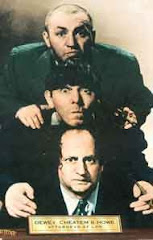
I just read an article on Medscape.com that started my "Spider-sense tingling". I have an almost visceral mistrust of people who try to bribe you, and this seems to fall into that category. See what you think...
The part I like the best is the following:
There are 4.4 billion prescriptions written annually in the United States.
The National ePrescribing Patient Safety Initiative, a coalition of health care and technology companies including Dell, Aetna, Microsoft, Google and WellPoint, has offered to provide e-prescribing software from Allscripts to any doctor for free.
On July 1, the two biggest e-prescribing networks announced that they were merging to form a single, secure, nationwide network for e-prescriptions and exchanging health data.
RxHub, a joint-venture of pharmacy-benefit managers CVS Caremark, Express Scripts and Medco Health Solutions, joined forces with SureScripts, a private company formed by the National Association of Chain Drug Stores and the National Community Pharmacists Association.
"We're really focused on seeing how we can help the market get to the elimination of the paper prescription pad," said Rick Ratliff, co-CEO of the new SureScripts-RxHub.
Uhhh...Why? And don't try to tell me that the largest drug stores, the largest medicine shipping company, and the entire computer industry are in this unholy alliance just for patient advocacy. There are billions to be made if we sheep will just fall in line. And what better way to make that happen than to use everyone's favorite bait - money?
The really hilarious bit, however, is that there is no better demonstration of just how far the medical profession has fallen than to see just how little people are willing to use for attempting to bribe us. I mean, seriously. Why don't you just spit on us while we're down. What are we, 1940s bellhops? "Hey, guys...uh...we'd really like you to buy all this new equipment. Not sure about it, huh? Well...uh...we have a couple of friends that I think might be able to talk some sense into you. Say hello to Abe Lincoln...and this is his friend George Washington."
This reminds me of an old story I heard once. Back in the day, in our recent agrarian past, everyone used mules or draft horses to plow and cultivate their fields. Eventually, someone invented the tractor. It was much more productive...when it worked. As someone who has used tractors, I can tell you first hand that you spend about as much time repairing them as using them. Anyway, the tractor manufacturers realized that they had a problem. If they introduced the tractors slowly and word got around that the tractors weren't the miraculous invention they'd been billed as, then farmers might just go back to using their well-trained and well-seasoned mules. No, that wouldn't have worked. They'd have to master the market in one explosive instant.
So they made the farmers an offer they couldn't refuse. They made even trades. Tractors for the farmers' mules, draft horses, donkeys...pretty much anything that'd pull a plow. Then they killed them. They killed them all. They buried them in mass graves. An entire generation of trained farm animals destroyed - animal genocide. Now there was no going back. They could have given the tractors away for free, for that matter. They would have a hundred generations of tractor-buying rubes to make their money back.
True story? I don't know. But it wouldn't surprise me. Caveat emptor, it's been said. I guess I'm just overly apocalyptic in my thinking, but once there are no more prescription pads, then we'll all be at the mercy of whoever sells the prescription-writing-machine.
As for me, they can have my prescription pad when they pry it from my cold, dead fingers. Or when they whip out "Andrew Jackson" to convince me.











1 comment:
Hmm...I too tend to be suspicious of "free" offerings.
But, as an objective party, I can see three benefits (aside from the profits for the companies) to going paperless:
1. Fewer mistakes. No more dealing with poor physician handwriting. And perhaps with computerized databases, any accidental mis-dosages or miscalculations for routine rx's may be avoided. Docs are human, too, and sometimes make mistakes.
2. Fewer forgeries. I don't know how often this is a problem. My only knowledge of this is from prime time television. But, I'm sure in some areas, it's more of a problem than others. Without access to the computer system, we could eliminate that problem.
3. It's environmentally-friendly. I'm all for not killing trees whenever possible.
Having spent many years in the military medical system, I have to say that I really like our computerized prescription program. I don't have to worry about keeping up with a piece of paper. I just walk up to the pharmacy window and ask for my meds. It's also nice that they have a listing of all of them, and can inform me of potential drug interactions.
I guess there are positives and negatives to just about everything. I do think, though, that paperless prescriptions are the wave of the future. I'm just surprised it's taken this long to get there.
Post a Comment